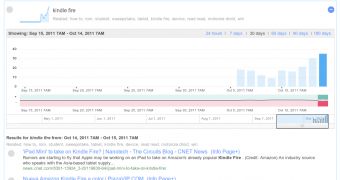Bit.ly is finally starting to leverage the power of the huge amounts of data that pass through the service every day. Bit.ly is popular enough to have a rather good idea of what links are popular, which are viral and, more importantly, which will be in the short term future.
Because that's what Bit.ly's latest product does, it sees in the future, the company boasts.
Bit.ly has developed a technology which helps it see what links are relevant for a certain query with the important distinction that it uses social triggers, how much a link is shared, to determine ranking, rather than a more static set of criteria as traditional social engines do.
What's more, it's able to analyze how a certain link is being shared, how fast it's growing, who is distributing it and where to predict how fast and how much it's going to grow.
"Instead of pagerank we’re using a different filter — for any given search query, we display the stories that we predict will get the most attention over the next 24 hours," Bit.ly explained.
"Then we use bitly’s analytics to refine our predictions in realtime. Our search technology is based on the the most valuable measure of engagement: the click," it said.
Bit.ly sees some 80 million links shortened each day. While activity around most links dies very shortly after they are created, some linger for a long time, so the amount of activity, i.e. clicks, Bit.ly sees is astonishing.
This is especially important considering that all of this activity is linked to important triggers such as the platform where the link is distributed, who created it in the first place and so on.
Bit.ly uses Zoie, a search technology created by LinkedIn and based on the open source Apache Lucene project, to scan and index pages.
The company is not releasing its search technology publicly, instead, it’s building on top of it and making it available for its Enterprise customers.
"The first product we’ve built on top of this technology is a reputation monitoring service. We added a layer of sentiment analysis to our search results and built an alert system that lets our customers know what people are saying about products, brands, or about any topic on social media," Bit.ly explained.
Enterprise users will be able to set up a series of keywords to be monitored and they can be notified whenever one is seeing unusual activity, such as a spike in link traffic or a sudden change in 'mood.' The reputation monitoring service will be rolled out in beta in the next couple of weeks.

 14 DAY TRIAL //
14 DAY TRIAL //